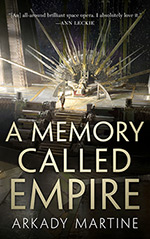
![]() imnotsusan
imnotsusan
5/2/2022
![]()
Considering all the hype, I was really underwhelmed by this book. An ambassador from an independent space station arrives at the center of a galactic empire with the memories of her predecessor uploaded to her brain to help her navigate the foreign culture and politics. When she arrives, not only does the upload fail, but she finds her predecessor has been murdered. Despite this very promising set-up, I found this book to be a very tedious read and am kind of amazed that I finished it. My biggest complaint is that I found the book to be over-written and under-plotted. There was way too many adjectives and metaphors to describe even the simplest, basic actions, some of which actually obscured the meaning of the sentence. (What does it mean, for instance, to say that "being alone in the city was like drowning in clear air"? When a sentence says, "she was proud of him, sickeningly so" - is that a good thing? Etc.) The murder mystery and the political intrigue weren't terribly intridcate or compellling (despite the characters constantly reassuring each other at length that things WERE very complicated.) Some of the "reveals" didn't really make sense. And the ratio of new action to time spent while the main character either (1) checking email, (2) rehashing previous events, or (3) indulging in a repetitive, obsessive inner monologue was pretty skewed, in my opinion. And, finally, I didn't believe or particularly like the characters - particularly the main character's emotional attachment to the mind upload of her predecessor. The predecessor has only a fleeting actual appearance in the story (as well as in the main character's head), yet so much time is dedicated to the main character insistng that she "misses" him, etc. We get so little about their relationship and - more importantly, way too little about the lived experience of using this technology (which forms the foundation of the whole plot) aside from some frankly superficial, sophomoroic bits of dialogue full of rhetorical questions like, "What does it mean to be a person?" in lieu of real, satisfying explanations.
However, as an aside: It does occur to me that some of what I perceived as being bugs might actually be features. Maybe the overly baroque and sometimes vague rhetorical style was meant to reflect the cultural setting that prized indirect, poetic speech. Maybe the book accurately captures the neurosis and occasional tedium of bureaucratic diplomacy. For all of my criticism, I coudl understand why some people really liked this book. But overall, it didn't do it for me.